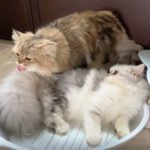You probably know the feeling. You’re sitting quietly when your feline companion suddenly approaches, gently pressing their head against your face or leg in that unmistakable gesture of warmth. That soft pressure, often followed by a rumbling purr, melts your heart every time.
This endearing behavior, which many people simply think of as a sweet way their cat says “hello,” is actually far more complex and meaningful than you might imagine. Your cat’s head nuzzle is like a secret language filled with emotional depth, territorial messages, and profound bonds that reach back to their wild ancestry.
Let’s explore the fascinating world behind this gentle gesture.
The Science Behind Those Special Head Bumps

When your cat nuzzles against you, they’re engaging in a behavior that serves multiple purposes including showing affection and marking territory through scent glands located on their faces. Cats have specialized scent glands on their cheeks, chin, top of their head, and base of their tail that contain pheromones, and when cats rub their face or tail against humans, other animals, or household items, they are leaving these pheromones behind.
These scent glands work by producing and releasing pheromones, which are chemical substances that help cats communicate and convey different messages specific to their species, including information about a cat’s identity, emotional state, and reproductive status. Humans cannot detect the pheromones released by cat scent glands since these chemical signals are specifically for cats to communicate with other cats.
Territory Marking Through Love

While nuzzling might seem purely affectionate, it also serves a territorial purpose as cats use this behavior to claim their space and the important objects and people within it, creating a map of their territory that other cats can detect by leaving their scent through nuzzling. This territorial marking isn’t aggressive; rather, it’s a way for cats to create a comfortable, familiar environment where they feel secure.
When your cat nuzzles you, they’re transferring their scent to you, which helps them establish their territory and communicate their ownership to other cats, essentially telling other animals that you belong to your cat. Since your cat’s personal scent on you fades over time, especially after you’ve been out in the world, they may want to mark you again by rubbing, headbutting, or even gently biting you, which allows your cat to reclaim you and releases endorphins that give your cat a sense of calm, happiness, and safety.
The Ultimate Expression of Trust and Affection

If your cat enjoys nuzzling you, it’s a sure sign that you’re doing something right as a pet owner and you should definitely congratulate yourself for being such an integral part of your pet cat’s life. Cats generally keep their distance from strangers, so the fact that your cat is rubbing themselves against you is a sign that they love you.
Head-butting may seem like an odd way of showing affection, but this nuzzling action is essentially a kitty kiss as your cat has glands in their cheeks and heads that release ‘happy messages,’ and when your cat nuzzles their face against you, they are marking you with their scent, which is a source of both comfort and familiarity for them and reminds them that you’re safe and part of their happy family.
A Greeting That Says “I Missed You”

Sometimes, a cat will nuzzle against its owner as a way to greet them, and nuzzling may be your cat’s way of saying “I’m happy to see you!” which you may notice more when you have been out of the house for a while or after returning home from work. Cats actually miss their owners when they’re left alone, so after finally seeing you again after a long day at work, you may find your cat nuzzling your head when you get home as a way to show you that they missed you and that they’re happy to see you again.
This reunion ritual is particularly meaningful because it demonstrates how deeply your cat values your relationship. In the wild, cats often snuggle together to feel safe and comfortable, and domesticated cats often possess some feral instincts that prompt them to rub against their human companions for love and affection.
Seeking Attention and Communication

Nuzzling can also be a request for attention since your kitty can’t tell you when they want food, love, or even a cleaner litter box, so they have to grab your focus to let you know they need you, and your pet might also get vocal or start pawing at you to grab your attention while nuzzling you. Many people may think that cats mind their own business and enjoy being left alone, but other cats may attempt to grab your attention by nuzzling, and you may find your cat rubbing against you as a way of informing you that they want food, or just plain old love and affection since your cat can’t verbally say what they want.
Cats do communicate in their own way and will often use rubbing, headbutting, and gentle biting as a sign of need, such as when your cat is rubbing against the cabinet that contains their food or treats to alert you that they’re hungry, or sometimes cats will aggressively rub against us to signal that something is wrong, which could be illness, or perhaps a gentle reminder to clean out their litter box or that they want to play.
Self-Soothing During Stressful Times

Just like humans do certain things to make themselves feel better when anxious or stressed out, our feline companions are no different, and if there’s been a change in your cat’s routine recently from moving homes to adding a new animal to the household, your pet could be anxious over it, with some cats taking to nuzzling as a way to comfort themselves when feeling stressed and overwhelmed.
Cats use their facial pheromones to help them feel familiarity or reassurance, and many cats will resort to nuzzling to seek comfort as it’s a natural behavior, though they may do it more if they feel anxious since they feel more comfortable and secure smelling their own scent when they nuzzle against you or objects around the house. In some cases, cats might nuzzle as a way to seek comfort and security, and this behavior is especially common among cats that have experienced trauma or stress, as nuzzling can help these cats feel more relaxed and comforted.
Understanding the Body Language Behind Nuzzling

Affectionate nuzzling is typically accompanied by relaxed body posture, soft eyes, forward-pointing whiskers, gentle purring, and a loosely held tail with a slight curve at the tip. When your cat nuzzles, pay attention to their overall body language since a relaxed cat will display soft eyes, forward-pointing whiskers, and a gently raised tail, which indicate that the nuzzling is indeed an expression of affection and comfort, though if your cat seems tense or their tail is twitching, they might be seeking attention for a specific need, such as food or play.
Nuzzling is like cat face snuggling where they’ll rub their face against you in a slow, soft way that’s more gentle than headbutting and is a way for them to express love, mark their territory, or greet you, and if your cat nuzzles you and then gently bites you, it’s usually a sign of affection and not aggression.
When Nuzzling Becomes Concerning

While nuzzling is part of your cat’s regular, daily communication, there can be times when nuzzling gets a little excessive whether your pet is nuzzling you or inanimate objects, and if kitty is nuzzling against things all too often, there could be a possible medical issue, so you should speak with your vet about it. There may be times when a cat may exhibit excessive rubbing or nuzzling behavior that may be concerning, and if your cat suddenly begins to aggressively rub against carpets or other objects, or if your cat shows an odd change in behavior or attitude, you should speak to your vet about your concerns since some common medical issues that can cause excessive rubbing in cats include fleas, allergies, ear infections, feline hyperesthesia syndrome, and intracranial disease.
If your cat is normally a nuzzler and suddenly stops nuzzling, then you may want to explore why since they may be experiencing a behavioral or underlying medical issue that requires attention. Being attuned to these changes helps ensure your feline companion remains healthy and happy.
Your cat’s gentle head nuzzle represents one of the most beautiful forms of interspecies communication. This simple gesture carries messages of love, trust, territorial claims, and emotional needs all wrapped into one tender moment. Cat nuzzling is a beautiful example of how our feline companions communicate their trust, affection, and territorial needs, and understanding this behavior helps us better appreciate and respond to our cats’ social and emotional requirements, strengthening the unique bond between humans and their feline friends. Next time your cat presses their head against you, remember that you’re receiving a complex love letter written in the ancient language of feline affection. What do you think about this fascinating behavior? Tell us in the comments.





